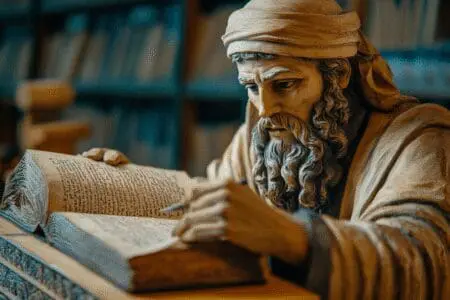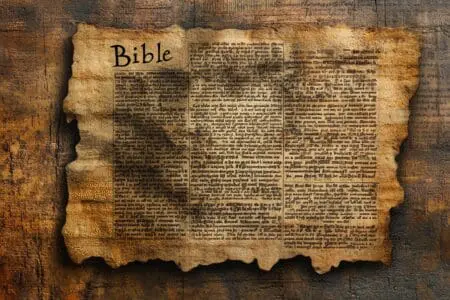Have you ever sat in a hotel room, picked up that Gideon’s Bible from the nightstand, and just wondered, who decided? Who picked these specific books—Genesis, Psalms, Matthew, Revelation—to be in this collection? It’s a book that has shaped history, yet most of us, myself included for a long time, don’t really know its origin story.
It’s not like there was a single, secret meeting in a smoke-filled room where a group of guys voted on which books made the cut. The real story is far more human, more complex, and honestly, a lot more interesting. It’s a story of centuries of use, debate, and reflection by communities of faith. It’s a process, not a proclamation.
Understanding how the books of the Bible were selected isn’t about weakening faith; for me, it’s about appreciating the deep, messy, and very real human history behind the text.
More in Bible Category
When Was the Ethiopian Bible Written
Key Takeaways
- It Was a Process, Not an Event: The biblical canon wasn’t decided in a single meeting. It was a gradual process of recognition that took place over more than a thousand years.
- Usage Was Key: The most important factor was which texts were being actively used, read, and found meaningful by Jewish and Christian communities in their worship and teaching.
- Councils Confirmed, They Didn’t Decide: Church councils that met in the 4th century (and later) didn’t create the canon from scratch. They largely affirmed the list of books that had already achieved consensus across the churches.
- There Were Disagreements: Not everyone agreed on every book. Some books that are in the Bible today were debated for a time, and some that are not in the Bible were popular in certain regions.
So, What Was the First Bible, Then?
That’s a bit of a trick question. Before there was a “Bible” as we know it, there were scrolls. Lots of them. For the Jewish people, these were the sacred texts that made up the Hebrew Bible. You might know it as the Old Testament.
This wasn’t a single book, but a library of scrolls containing history, laws, poetry, and prophecy. The process of gathering these texts started long before Jesus was born.
How did the Old Testament come together?
Think of it in three stages. The Jewish people didn’t get a finalized table of contents one day. Instead, they recognized the authority of different collections of writings over many, many centuries.
- The Law (Torah): This is the foundation. The first five books—Genesis, Exodus, Leviticus, Numbers, and Deuteronomy. These were the first to be universally accepted as scripture in Judaism. By around 400 B.C., this collection was pretty much set.
- The Prophets (Nevi’im): This collection includes the historical books like Joshua and Kings, as well as the prophets like Isaiah and Jeremiah. These writings were seen as the continuing story of God’s relationship with Israel and were widely accepted by around 200 B.C.
- The Writings (Ketuvim): This is the final section and includes a diverse mix of books: Psalms, Proverbs, Job, Song of Solomon, and others. The authority of some of these books, like Esther and Ecclesiastes, was debated by different Jewish groups for a while. This part of the canon took the longest to be finalized, likely around the first century A.D.
This whole process was organic. It grew out of the life of a nation. These were the stories they told their children, the laws that structured their society, and the songs they sang in worship. No one had to force them to accept these books; they were already the lifeblood of their faith.
Okay, But What About the New Testament? That’s the Christian Part, Right?
Exactly. And the process for the New Testament was similar in spirit, but it happened much faster. After Jesus’s life, death, and resurrection, his followers were left with a powerful experience and the teachings of the apostles. They didn’t immediately sit down to write a new bible. They were too busy starting churches and telling people about Jesus.
Their “scripture” was still the Hebrew Bible. But as they spread out, they started writing things down.
Who were the first people deciding this stuff?
There wasn’t a formal committee. The decision-makers were the thousands of anonymous believers in small house churches scattered across the Roman Empire. They were the ones who received a letter from the Apostle Paul, treasured it, copied it by hand, and shared it with the church in the next town over.
I used to picture a bunch of bearded old men in robes making these grand decisions. But the reality was more grassroots. It was about which writings were actually helping people live as Christians. Which letters from Paul settled a dispute in a church? Which telling of Jesus’s life—like Mark’s or Luke’s—resonated most deeply when it was read aloud on a Sunday?
It was a slow, decentralized, and organic process of circulation and validation. The books that became scripture were the ones that proved themselves useful and true on the ground.
Were there some basic rules they followed?
As scholars look back, they can see a few informal criteria that the early church seemed to apply when figuring out which books carried real weight. It wasn’t a formal checklist, but a set of guiding principles that emerged over time.
You could almost compare it to figuring out which family stories are the “official” ones.
- Was it connected to an apostle? The most important test was apostolic authority. Was the book written by one of Jesus’s original twelve disciples (like Matthew or John) or by someone who was a close associate of an apostle (like Mark, who was tied to Peter, or Luke, who traveled with Paul)? This ensured the teaching was grounded in the original eyewitness accounts.
- Was it accepted by churches everywhere? This was a big one. A letter might be popular in one city, but did churches from Spain to Syria also value it? The books that made it into the New Testament were the ones that gained a wide and lasting consensus across the Christian world. The Gospel of John, for example, wasn’t just loved in Ephesus; it was being read and revered everywhere.
- Did it fit with the rest of the story? The early church had a core set of beliefs about who Jesus was and what he taught, passed down from the apostles. This was sometimes called the “rule of faith.” Any new writing had to be consistent with this foundational teaching. If a book came along that portrayed a completely different Jesus, it was a major red flag.
This wasn’t a perfect system, and it led to some debates. But it created a powerful filter. The books that passed through were the ones that were well-vetted by the lived experience of the church.
Did Some Books Almost Make It In? What about the “Lost Books”?
This is where it gets really interesting for a lot of people. You hear about these so-called “lost gospels” and it sounds like a conspiracy, like the church tried to bury some secrets. The truth is a little more mundane, but it reveals a lot about the selection process.
There were dozens of other gospels and writings floating around in the first few centuries. Some were very popular in certain areas. Books like The Shepherd of Hermas or the Epistle of Barnabas were read in some churches and even show up in a few early Bible manuscripts.
They just didn’t end up having the same staying power or universal appeal as, say, the Gospel of Luke. They were eventually seen as helpful and inspiring, but not quite on the same level as the apostolic writings.
I’ve heard of the Gospel of Thomas. What’s that about?
The Gospel of Thomas is probably the most famous of the non-canonical gospels. It’s not a story of Jesus’s life like Matthew or Mark. Instead, it’s just a collection of 114 sayings attributed to Jesus.
The early church leaders were pretty wary of it, and it’s easy to see why. The version of Jesus in Thomas sounds very different from the one in the four gospels that were being widely used. It reflects a different spiritual movement that became known as Gnosticism, which taught that salvation came through secret knowledge, not faith in Jesus’s death and resurrection.
Because its message was so out of sync with the core “rule of faith” that the apostles had established, it never gained broad acceptance. It wasn’t “suppressed” in some grand conspiracy; it was simply rejected by the majority of Christians as not being a reliable account of Jesus’s teaching. You can explore more about the non-canonical texts and the formation of the New Testament through academic resources like those provided by the Society of Biblical Literature’s Bible Odyssey project.
So these books weren’t “banned” in some conspiracy?
That’s the key takeaway for me. The process was more about inclusion than exclusion. It wasn’t about a group of powerful men banning books they disliked. It was about communities of faith, over generations, recognizing and elevating the books they found to be the most authentic, reliable, and life-giving.
The books that didn’t make it in simply failed to convince the majority of believers over the long haul. They faded away not because of a secret plot, but because they weren’t as useful, as historically grounded, or as theologically consistent as the ones that did.
So When Did It All Become “Official”?
For the first three hundred years of Christianity, there was no “official” New Testament. There was a core collection that almost everyone agreed on—the four Gospels, the book of Acts, and most of Paul’s letters. But there was still some fuzziness around the edges.
Some people were unsure about books like Hebrews or Revelation. Others in different regions really liked books we don’t have in our Bible today.
This started to change in the 4th century. After the Roman Emperor Constantine converted, Christianity went from a persecuted minority to the dominant religion of the empire. With this new stability, church leaders had the chance to meet and formalize things that had been informal for centuries.
The lists start showing up.
A key moment came in the year 367 A.D. Athanasius, the influential bishop of Alexandria, wrote an Easter letter to his churches. In this letter, he listed the 27 books of the New Testament that he considered to be the definitive canon.
His list is the exact same 27 books that you find in a modern Bible today.
This wasn’t a new idea he just came up with. He was reflecting the consensus that had been building and solidifying in the churches for generations. He was putting on paper what had become the common practice.
Shortly after Athanasius’s letter, several regional church councils—like the Council of Hippo (393 A.D.) and the Council of Carthage (397 A.D.)—met and affirmed this same list of 27 books. Again, these councils didn’t pull the list out of thin air. They were officially ratifying the collection of books that the overwhelming majority of Christians already recognized as scripture.
Wait, what about the Catholic Bible having extra books?
This is a great question and it can be confusing. The difference isn’t in the New Testament—all major Christian traditions accept the same 27 books. The difference is in the Old Testament.
Remember how the collection of the Hebrew Bible was a long process? Around 250 B.C., a Greek translation of the Hebrew scriptures was made, called the Septuagint. This translation included several books that were not in the final Hebrew canon decided by Jewish rabbis—books like Tobit, Judith, and 1 & 2 Maccabees.
The early Christians, many of whom spoke Greek, used the Septuagint as their Old Testament. So, they were familiar with these “extra” books.
Fast forward to the Protestant Reformation in the 1500s. Leaders like Martin Luther wanted to base their faith strictly on the original sources. When it came to the Old Testament, Luther and other reformers decided to stick with the books in the official Hebrew Bible and set the others aside. They didn’t discard them entirely but placed them in a separate section called the “Apocrypha,” which means “hidden things.”
The Catholic Church, in response at the Council of Trent, officially affirmed that these books (which they call the Deuterocanonical books) were indeed part of the biblical canon.
So, the difference is all about which version of the Old Testament canon you follow: the one from the Hebrew tradition or the one from the Greek Septuagint tradition.
What Does This All Mean?
Thinking about how the books of the Bible were selected has changed the way I see it. It’s no longer a magical book that dropped out of the sky. It’s a library of texts that were lived with, prayed over, debated, and treasured by real people.
The Bible was forged in the life of the community. It’s a testament to a centuries-long conversation between God and people. Knowing the messy, human history behind it—the debates, the disagreements, the slow process of recognition—doesn’t diminish its power.
For me, it anchors it in reality. It makes the book on my nightstand feel less like a distant artifact and more like a living collection of stories and letters, preserved and passed down through generations because they found them to be true. And that, I think, is a story worth knowing.
Frequently Asked Questions – How Were the Books of the Bible Selected

Was the selection of Bible books a human process or God’s miracle?
The selection of the books of the Bible was ultimately God’s miracle. God decided what He wanted to communicate and guided His Spirit to inspire the right writings. The church recognized and treasured these writings over centuries, confirming that God’s perfect plan ensured His Word’s preservation and authority.
How did the early church know which New Testament books were Scripture?
The early church determined which books were Scripture through three main tests: apostolic connection, universal use by churches, and whether the teaching matched the truth about Jesus. Books written by apostles or close associates, widely accepted by all churches, and aligning with the core teachings of Jesus were recognized as inspired scripture.
Did a Jewish council decide the Old Testament canon?
Most scholars now agree that the Old Testament list was not decided in a single council like the hypothetical Council of Jamnia. Instead, it was gradually recognized and accepted by God’s people over more than a thousand years, based on their longstanding agreement on which writings were truly inspired by God.
Why do Catholic Bibles have more books than Protestant Bibles?
Catholic Bibles include extra books called the Apocrypha, written between the Old and New Testaments. These were accepted by the early church but were not part of the Hebrew Scriptures used by Jewish people. Protestant leaders like Martin Luther returned to the original Hebrew list of books that Jesus and the apostles used, which is why Protestant Bibles have fewer books in the Old Testament.




